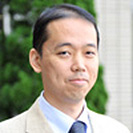

Message
 Professor Seiji Hashimoto
Professor Seiji Hashimoto
"Cycle-Oriented Society (循環型社会)" is a term to describe a vision of a society toward a sustainable world. Not only does it designate sound cycles of resources and wastes symbolized by 3Rs (Reduce, Reuse and Recycle); it expresses a broader vision including sound cycles of carbon and nutrients in nature and cycles of relationships in a society. Development of a socioeconomic system that uses limited earth resources cyclically at an appropriate level is an important task to achieve a sustainable society, given an increasing and increasingly wealthy global population. What are such technological and social systems like? Our laboratory strives to conduct research that contributes to the development of a "Cycle-Oriented Society" or "sustainable resource and waste management" from the viewpoint of a systems analysis approach. See "Research" page for examples of our research topics.
An important personal accomplishment during one's university days is to discover what a person really likes to do. There is a saying, "What one likes, one will do well". Show yourself in many places, try as many things as possible, and find what you like what you can stick to, what you can devote yourselves to, and what you enjoy. Then, try to master it more deeply than anyone else. When you try to master one thing, you will be aware that there are many other aspects related to what you try to master. That is to say, to master one subject demands further and broader education. Yes, you should keep studying all your life. Then, think about the relation between what you like and society to ascertain how to make a living with it. Your "what you like" might not be directly fruitful as your occupation, but there is certainly a job related to what you like or you can even create a job from it. If you know clearly "what you like" and want to keep on learning it, then you can face up to any difficulty you are confronted with.
When I was a student, I was interested in environmental issues and economically developing countries' issues. I took a year off from university and roamed around countries in Southeast Asia and South Asia. It was a penniless way of travelling, but it brought me gifts of touching occurrences and also dangerous incidents. I was often mistaken as a native resident during my travels, so I believe myself to have been a Southeast Asian in my former incarnation. I had worked in NGO and NPO activities related to issues on environment, development and people with disabilities. I had also experienced part time jobs of many kinds. When I wrote my undergraduate thesis, I thought I would never do such hard work again, but now it has turned out to be my occupation. I had "shown myself in many places and tried as many things as possible". This brought me eventually to understand that "what I like" is research and education on issues of environment and development. Furthermore, I decided to devote myself to this to contribute to our society. Let's tell some more stories at parties..…